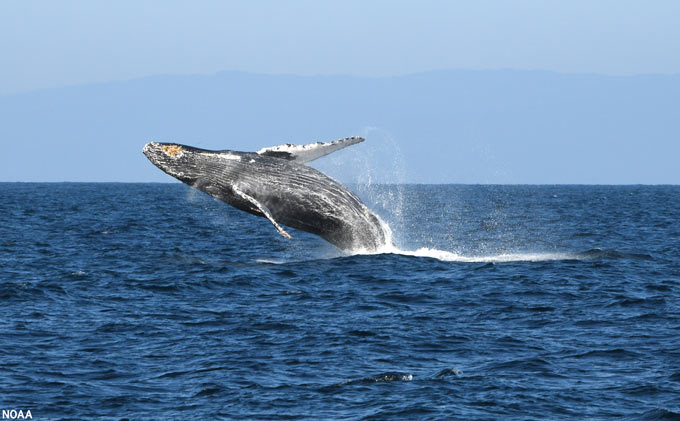
A humpback whale off Channel Islands National Marine Sanctuary. (NOAA)
February 1, 2024 - Washington, D.C. – U.S. Senator Ron Wyden on Wednesday reintroduced legislation that would end the future capture and breeding of whales for public display.
“Whales that are held in captivity live much shorter lives than in the wild, and despite rules passed to improve conditions in public display settings, this fact persists,” Wyden said. “Banning the trade and breeding of these four species of whales for the purpose of public display would further improve animal welfare nationwide. Additionally, by supporting whales in the wild, our bill also promotes more whale watching tourism which flourishes off the coast of Oregon, where major whale migrations occur each year.”
Studies have shown that certain cetaceans - specifically, orcas, beluga whales, pilot whales, and false killer whales - are cognitively, emotionally, and socially complex animals who cannot thrive in captivity. Whales who are held for display often exhibit signs of suffering and distress and die significantly younger than whales who live in the wild. Currently, there are roughly 50 whales being held in captivity in the United States.
The Strengthening Welfare in Marine Settings (SWIMS) Act would amend the Marine Mammal Protection Act of 1972, to prohibit the taking, importation, or exportation of any orca, beluga, pilot whale, or false killer whale within the U.S. for the purpose of public display. The bill would also amend the Animal Welfare Act to prohibit any breeding of these whale species for future public display. Exemptions for animals being transported to a sanctuary setting or to be released into the wild are included in the SWIMS Act.
The SWIMS Act was cosponsored by U.S. Senators Alex Padilla, D-Calif., Elizabeth Warren, D-Mass., Cory Booker, D-N.J, and Tammy Duckworth, D-Ill. The bill was led by U.S. Representatives Adam Schiff, D-Calif., Jared Huffman, D-Calif., and Suzan DelBene, D.-Wash., in the House.
The legislation is supported by the Animal Welfare Institute, Animal Legal Defense Fund, Born Free USA, Cetaceans.org, Cetacean Society International, CompassionWorks International, Dolphin Project, Earth Law Center, FOUR PAWS USA, Humane Society Legislative Fund, and more.
The full text of the bill is here.
Source: Senator Ron Wyden








